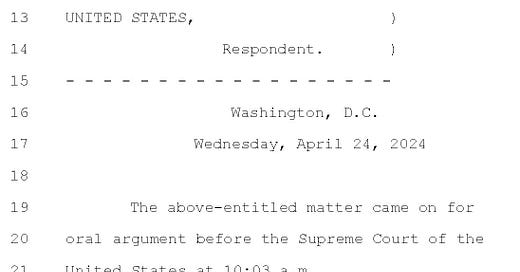Bonus 77: Why You Should Listen to the EMTALA Oral Argument
The Court may yet hold that federal law preempts state abortion bans in cases of non-life-threatening medical emergencies. But several justices tried very hard to resist that conclusion on Wednesday
Welcome back to the weekly bonus content for “One First.” Although Monday’s regular newsletter will remain free for as long as I’m able to do this, much of the bonus content is behind a paywall as an added incentive for those who are willing and able to support the work that goes into putting this newsletter together every week. I’m grateful to those of you who are already paid subscribers, and hope that those of you who aren’t will consider a paid subscription if and when your circumstances permit:
I usually don’t write about Supreme Court arguments right after they happen. For starters, although I don’t think arguments are irrelevant, I do think that their significance tends to be inversely proportional to the significance of the case—where, the bigger deal the case is, the less likely oral argument is going to be dispositive. And big case or small case, arguments also are not always predictive of how the Court is going to rule—so that analysis of the argument could easily be overtaken by subsequent events. Finally, focusing on the arguments gives short shrift to the briefs—where the most extensive and careful factual and legal analysis is usually found.
But after listening to yesterday’s 114-minute oral argument in Moyle v. United States on whether a federal statute (EMTALA) preempts Idaho’s abortion ban in cases in which an abortion is medically necessary to stabilize a patient with a non-life-threatening medical emergency, I felt impelled to write about it—even at the expense of a preview of the oral argument later this morning in Trump v. United States, which raises whether former President Trump is immune from criminal prosecution for his alleged efforts leading up to and on January 6.
The Trump case is obviously massively important both legally and politically. But it’s the argument in the EMTALA case that may end up saying more about where the Court currently is as an institution—and a lot of it … ain’t good. There may ultimately be five votes to side with the federal government here—or, at the very least, to read the medical exceptions to Idaho’s abortion ban broadly enough to eliminate the conflict with EMTALA, so that Idaho wins a largely Pyrrhic victory. But as someone who tends not to be surprised by this Court that often, I was really floored by the willingness of at least three (and maybe four) of the justices to lean into arguments that (1) Idaho hadn’t even made; and/or (2) would turn settled principles of federalism on their head—all in the name of barring medically necessary emergency abortions. And going by some of the questions from Justices Sotomayor, Kagan, Jackson, and Barrett, and some of the responses from Solicitor General Prelogar, I don’t think I was the only one.
For those who are not paid subscribers, the next free installment of the newsletter will drop on Monday morning. For those who are, please read on.
Keep reading with a 7-day free trial
Subscribe to One First to keep reading this post and get 7 days of free access to the full post archives.




